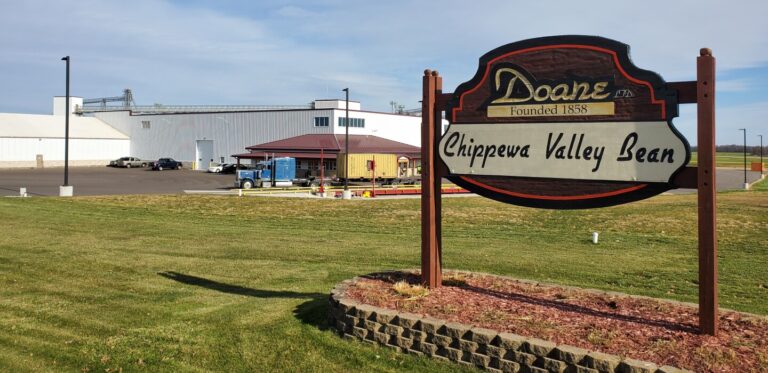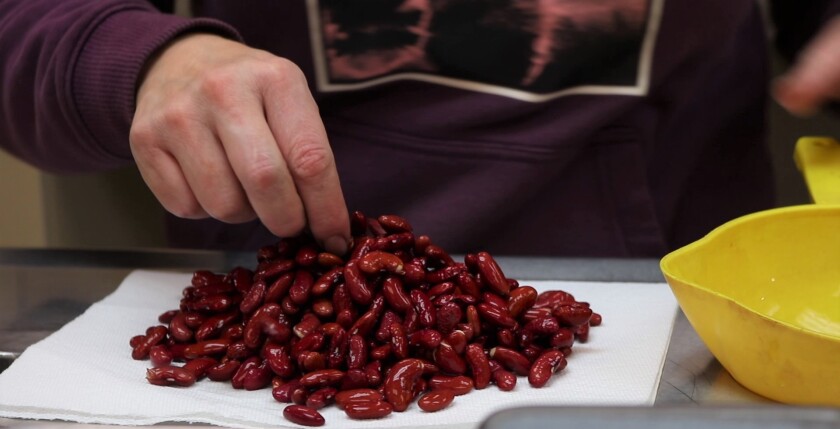
MENOMONIE, Wis. — Innovation at Chippewa Valley Bean is what has made it the world’s largest processor and exporter of kidney beans, and innovation is what will carry it strongly into the future.
Charles Wachsmuth is Chippewa Valley Bean’s sales and marketing vice president. Chippewa Valley Bean was founded in 1972 by Wachsmuth’s grandfather, Russell Doane, and a cousin of his, Bob Wachsmuth.
“On a daily basis, we have three generations come into the office,” said Wachsmuth.
The company was originally a grower processor, meaning that it predominantly was processing its own beans. Over time, it began to bring on other growers along the upper Midwest, and throughout the 1980s worked mainly with domestic markets.
Wachsmuth said it was Cindy Brown (Russell Doane’s daughter), now president of Chippewa Valley Bean, who started taking over sales and first broke into markets in the United Kingdom and into Europe in general. Today, Chippewa Valley Bean is the largest processor and exporter of kidney beans in the world.
“We export to about 30 countries on a yearly basis on five different continents,” said Wachsmuth.
Chippewa Valley Bean buys kidney beans from 100 to 120 family farms across from Wisconsin, Minnesota, North Dakota and South Dakota.
“From there, we bring the beans in and we clean them, we process them, and then we ship them out to canners and packagers around the world,” said Wachsmuth. “We don’t do anything except condition and clean the raw product.”
Equipment such as fanning mills, gravity tables and destoners can be found in the processing facility of Chippewa Valley Bean which is near the Chippewa River.
Chippewa Valley Bean also utilizes electronic color sorters, as well as a machine called a crab neck or pin sorter, which is a large cylinder with “tens of thousands of needles” that work well for sprouts and skin checks, said Wachsmuth.

Contributed / Chippewa Valley Bean
Kidney beans tend to come in three types, said Wachsmuth — dark red, light red and white.
Kidney beans are a specialty crop and it takes specialty equipment to combine them and requires a different type management in the field, said Wachsmuth. Kidney beans are also a cosmetic product, he said, and the value in a kidney bean comes from whole intact skin, and the value is lowered if the skin wrinkles or varies in color.
“If you’re a consumer and you open up that can of kidney beans and pour it out, you want to see that beautiful field of mahogany, and you want to see all the same size and all the same shape,” said Wachsmuth.
Kevin Dettler, a grower in South Dakota who’s delivered kidney beans to Chippewa Valley Bean for over 30 years, said their farm grows beans in a “hostile” environment which can lead to low moisture beans that are susceptible to skin checks.
“No other processor has the equipment to preserve the quality of my beans,” said Dettler of Chippewa Valley Bean. “It’s no secret that many things can happen to our bean crop, such as hail producing odd-shaped beans, fog right at harvest producing sprouts, or too much rain at harvest producing muddy beans. Chippewa has handled all of these problems for me. Never once have my beans been turned away because of flaws in quality.”

Noah Fish / Agweek
This past year has challenged the staff at Chippewa Valley Bean to think about innovation.
“Logistics has been difficult,” said Wachsmuth. “If it’s not container shortages it’s (Canadian Pacific) rail out of Minneapolis throttling the amount of trains going to Montreal.”
That was the traditional shipping route for many years for Chippewa Valley Bean, until the company
said Wachsmuth.
Wachsmuth said the company is also seeing indirect pressure from the war in Ukraine and its impact on fuel prices.
“Our largest customer in Italy, in September of 2021, paid 6 million euros for their natural gas,” he said. “In September of 2022, they paid 24 million euros for the same amount of fuel — so what we’re seeing is increased pressure from our customers to lower costs.”
The pressure goes back to 2018 to the steel and aluminum tariffs and the EU’s response to them, he said.
“The worldwide steel and aluminum prices are still high,” he said. “So our customers are still paying more for those raw materials that way.”
Another challenge this year was the price of corn and soybeans and other commodity crops, said Wachsmuth.
“That depressed our acres, because as we saw this pressure from our customers that we needed to keep prices stable or low, we saw our competitor crops being of super high value,” he said. “So it was much harder this year to get a crop of kidney beans in the ground — and no hard feelings on that, because a farmer and a grower needs to go where they’re getting the most value out of their land.”
Doane Limited is a sister company to Chippewa Valley Bean, and a test ground for new equipment for new seed varieties and new techniques in the field, said Wachsmuth.
“We’re always looking at different ways to bring better value back to our growers,” he said. “There are no beans that come onto our property that are wasted. We’ve created seven in-house grades, and we can market all of those grades domestically or around the world.”
Chippewa Valley Bean is also innovative in the way it approaches sustainability.
“This year, we are the first edible bean processor in the United States to have passed a third party ethical supply chain audit,” said Wachsmuth. “We’ve redesigned our truck traffic to save 11,000 diesel miles per year, just on trucks moving around the facility, and as you look at our distribution center, it was designed in mind to save energy.”
“I fully believe, maybe not in 2023, but by 2024 we’ll have a full three scope carbon audit done, and we’ll have set a neutrality date,” he said. “And this stuff is important, in fact, one of our most important domestic customers has said, ‘If you can come through with a carbon neutral bean, we will package that separately and it will have its own label.’ Is anybody requiring the steps of us now? Not yet, but it’s only a matter of time.”